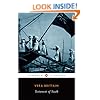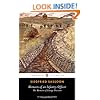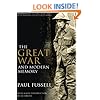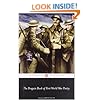


Flip to back
Flip to front

Good-Bye to All That: An Autobiography Paperback – Large Print, February 1, 1958
See all 30 formats and editions
Hide other formats and editions
| Amazon Price | New from | Used from |
|
Mass Market Paperback
"Please retry"
|
—
|
— | $19.91 |
|
Unknown Binding
"Please retry"
|
—
|
— | $40.00 |

$11.54
FREE Shipping on orders over $35.
In Stock.
Ships from and sold by Amazon.com.
Gift-wrap available.
NO_CONTENT_IN_FEATURE
Tell the Publisher!
I'd like to read this book on Kindle
Don't have a Kindle? Get your Kindle here, or download a FREE Kindle Reading App.
I'd like to read this book on Kindle
Don't have a Kindle? Get your Kindle here, or download a FREE Kindle Reading App.
Best Books of the Month
Want to know our Editors' picks for the best books of the month? Browse Best Books of the Month, featuring our favorite new books in more than a dozen categories.
Want to know our Editors' picks for the best books of the month? Browse Best Books of the Month, featuring our favorite new books in more than a dozen categories.
Product Details
Would you like to update product info or give feedback on images?.
|
Editorial Reviews
Amazon.com Review
The quintessential memoir of the generation of Englishmen who suffered in World War I is among the bitterest autobiographies ever written. Robert Graves's stripped-to-the-bone prose seethes with contempt for his class, his country, his military superiors, and the civilians who mindlessly cheered the carnage from the safety of home. His portrait of the stupidity and petty cruelties endemic in England's elite schools is almost as scathing as his depiction of trench warfare. Nothing could equal Graves's bone-chilling litany of meaningless death, horrific encounters with gruesomely decaying corpses, and even more appalling confrontations with the callousness and arrogance of the military command. Yet this scarifying book is consistently enthralling. Graves is a superb storyteller, and there's clearly something liberating about burning all your bridges at 34 (his age when Good-Bye to All That was first published in 1929). He conveys that feeling of exhilaration to his readers in a pell-mell rush of words that remains supremely lucid. Better known as a poet, historical novelist, and critic, Graves in this one work seems more like an English Hemingway, paring his prose to the minimum and eschewing all editorializing because it would bring him down to the level of the phrase- and war-mongers he despises. --Wendy Smith
Review
Autobiography by Robert Graves, published in 1929 and revised in 1957. It is considered a classic of the disillusioned postwar generation. Divided into anecdotal scenes and satiric episodes, Good-Bye to All That is infused with a dark humor. It chronicles the author's experiences as a student at Charterhouse School in London and as a teenaged soldier in France during World War I, where he sustained severe wounds in combat. His memoir continues after the war with descriptions of his life in Wales, at Oxford University, and in Egypt. -- The Merriam-Webster Encyclopedia of Literature
More About the Author
ROBERT GRAVES (1895-1985) was an English poet, translator, and novelist, one of the leading English men of letters in the twentieth century. He fought in World War I and won international acclaim in 1929 with the publication of his memoir of the First World War, Good-bye to All That. After the war, he was granted a classical scholarship at Oxford and subsequently went to Egypt as the first professor of English at the University of Cairo. He is most noted for his series of novels about the Roman emperor Claudius and his works on mythology, such as The White Goddess.
Customer Reviews
Most Helpful Customer Reviews
135 of 139 people found the following review helpful
By
Robert Moore
HALL OF FAMETOP 500 REVIEWERVINE VOICE on October 27, 2002
Format: Paperback
4 Comments
Sending feedback...
GOOD-BYE TO ALL THAT is about considerably more than just Graves's experiences in the trenches in WW I, but it is that section of the book that makes this memoir stand apart from most others. That, and the exceptional honesty of the book, which manages to be tell-all without being gossipy. There is also a sense of renunciation; instead of nostalgic longing to recover the past as one find in other memoirs, Graves is anxious to put the past aside for good, to have done with it entirely.
The best parts of the book are those dealing with his dreadful time in school, he time serving in the war, and his various friendships. Some of those friendships sneak up on you. He writes at length of a literature professor at school named George Mallory who profoundly molded his reading and literary sensibilities. He writes for page after page about "George," but it isn't until he begin a chapter with the words, "George Mallory did something better than lend me books: he too me climbing on Snowdon in the school vacation." It wasn't until that moment that I realized that George Mallory the literature instructor was THAT George Mallory, the famous mountain climber who attempted Everest (and perhaps conquered it) "because it is there." George becomes one of Graves's greatest friends, and even serves as best man in his wedding. The other friendship I found fascinating, perhaps because the man himself remains one of the most mystifying characters of the 20th century, was T. E. Lawrence. As Lawrence removed himself from the public eye more and more in the 1920s and 1930s, being in 1920 perhaps one of the most famous individuals in the British Empire, he changed personas from Lawrence of Arabia to Private Shaw, reenlisting in the Army as an auto mechanic.Read more ›
The best parts of the book are those dealing with his dreadful time in school, he time serving in the war, and his various friendships. Some of those friendships sneak up on you. He writes at length of a literature professor at school named George Mallory who profoundly molded his reading and literary sensibilities. He writes for page after page about "George," but it isn't until he begin a chapter with the words, "George Mallory did something better than lend me books: he too me climbing on Snowdon in the school vacation." It wasn't until that moment that I realized that George Mallory the literature instructor was THAT George Mallory, the famous mountain climber who attempted Everest (and perhaps conquered it) "because it is there." George becomes one of Graves's greatest friends, and even serves as best man in his wedding. The other friendship I found fascinating, perhaps because the man himself remains one of the most mystifying characters of the 20th century, was T. E. Lawrence. As Lawrence removed himself from the public eye more and more in the 1920s and 1930s, being in 1920 perhaps one of the most famous individuals in the British Empire, he changed personas from Lawrence of Arabia to Private Shaw, reenlisting in the Army as an auto mechanic.Read more ›
Thank you for your feedback.
If this review is inappropriate, please let us know.
Sorry, we failed to record your vote. Please try again
91 of 94 people found the following review helpful
By
Robert O'Matic
on November 30, 2011
Format: Paperback
Verified Purchase
8 Comments
Sending feedback...
There were two editions of this Robert Graves Classic: "Goodbye to All That" made by the author during his lifetime. The first came out in the 20s and was raw and popular and controversial. The second came out in the 50s and was somewhat bowdlerized by the author, because several of the people involved were still alive. His nephew oversaw an edition in 1995 which explained some of the reasons for the changed second edition and restored some of the original material. If you pay attention to details, find out which edition you are getting. I have downrated this edition because it is the second. I purchased the Richard Perceval Graves version off of Amazon about a year ago.
If this is too nitpicky for you, the second edition is still very good, it is missing some interesting material however, particularly the opening poem by Laura Riding and Graves' interesting dedication to her at the end of the book.
If this is too nitpicky for you, the second edition is still very good, it is missing some interesting material however, particularly the opening poem by Laura Riding and Graves' interesting dedication to her at the end of the book.
Thank you for your feedback.
If this review is inappropriate, please let us know.
Sorry, we failed to record your vote. Please try again
73 of 76 people found the following review helpful
By
bensmomma
on May 6, 2003
Format: Paperback
Comment
Sending feedback...
I spotted this remarkable book on ... Top 100 Non-Fiction Books of the Century list. In "Good-bye to All That, " the British poet Robert Graves (1895-1985), best known to American readers as the author of the novel of ancient Rome, "I Claudius," writes the autobiography of his youth, justifiably famous for its eloquent but straight-forward depiction of the horrors of WWI, during which Graves spent years in the trenches of France as an army captain.
More than the war, however, Graves' topic is the passing of an era: the class-ridden and naïve culture of the Edwardian upper classes, a culture did not survive the war. Graves came from a landed family and received a classic boarding-school education. Even in the trenches officers like Graves had personal servants and took offense when they had to dine with officers of `the wrong sort' (promoted from the lower classes).
Graves' narrative itself barely survives the end of the war; the post-war chapters seem listless and shell-shocked, emotionally detached. The battles he survived are written about with precision, gravity, and emotional impact; but Graves' marriage and the birth of his children seem like newspaper reports. Surprisingly, he doesn't even talk of his poetry much. This, surely, is not a defect of the book but a genuine reflection of his feelings at the time: After the War, nothing meant much to him.
Graves' literary style is very matter-of-fact--the opposite of the imagistic, adjective-driven language one might expect of a poet. Instead, he had a gift for the right details: in only a sentence or two, by careful description, he can perfectly describe a fellow-soldier or give the exact sense of `being there' in battle. The book is a remarkable achievement worth reading even for those who may be glad the old days were left behind.
More than the war, however, Graves' topic is the passing of an era: the class-ridden and naïve culture of the Edwardian upper classes, a culture did not survive the war. Graves came from a landed family and received a classic boarding-school education. Even in the trenches officers like Graves had personal servants and took offense when they had to dine with officers of `the wrong sort' (promoted from the lower classes).
Graves' narrative itself barely survives the end of the war; the post-war chapters seem listless and shell-shocked, emotionally detached. The battles he survived are written about with precision, gravity, and emotional impact; but Graves' marriage and the birth of his children seem like newspaper reports. Surprisingly, he doesn't even talk of his poetry much. This, surely, is not a defect of the book but a genuine reflection of his feelings at the time: After the War, nothing meant much to him.
Graves' literary style is very matter-of-fact--the opposite of the imagistic, adjective-driven language one might expect of a poet. Instead, he had a gift for the right details: in only a sentence or two, by careful description, he can perfectly describe a fellow-soldier or give the exact sense of `being there' in battle. The book is a remarkable achievement worth reading even for those who may be glad the old days were left behind.
Thank you for your feedback.
If this review is inappropriate, please let us know.
Sorry, we failed to record your vote. Please try again
51 of 56 people found the following review helpful
By
A Customer
on April 3, 1999
Format: Paperback
Comment
Sending feedback...
This is Robert Graves' tell all autobiography, or at least the "revised second edition" which doesn't quite tell all. At the time of writing Graves was only 33 yet already had about 30 publications to his name, mostly poetry collections & essays. He had rubbed shoulders with such writers as Edward Marsh, Robert Frost, Siegfried Sasson, T.E. Lawrence, Ezra Pound & Edith Sitwell. Graves had served as a Royal Welsh Fusiler for almost the entire duration of WW1 & been severely wounded, even pronounced dead, before being demobilized. After the war Graves went on to receive his B Litt. degree from Oxford & eventually found a position as the Professor of English Literature at the Royal Egyptian University in Cairo. All this & numerous other stories, events & anecdote are given here in full detail.
Goodbye To All That is most famous for it's graphic & realistic depiction of life in the trenches of WW1. Graves goes into all the details of his military experience. We aren't spared a single battle or a single death. He captures the horror & awe of the war with a roughness that made the book one of the most popular written accounts of WW1. We are presented with scenes of atrocities, suicides, murders & heroic rescues one after another until we can almost feel the emotional change that Graves himself felt as he went from innocent schoolboy to professional soldier. The physical & emotional damage caused by this change are themes that Graves would return to again & again for the remainder of his life.
Oddly enough the man who is most famous as a romantic poet talks very little of his poetry in his autobiography.Read more ›
Goodbye To All That is most famous for it's graphic & realistic depiction of life in the trenches of WW1. Graves goes into all the details of his military experience. We aren't spared a single battle or a single death. He captures the horror & awe of the war with a roughness that made the book one of the most popular written accounts of WW1. We are presented with scenes of atrocities, suicides, murders & heroic rescues one after another until we can almost feel the emotional change that Graves himself felt as he went from innocent schoolboy to professional soldier. The physical & emotional damage caused by this change are themes that Graves would return to again & again for the remainder of his life.
Oddly enough the man who is most famous as a romantic poet talks very little of his poetry in his autobiography.Read more ›
Thank you for your feedback.
If this review is inappropriate, please let us know.
Sorry, we failed to record your vote. Please try again











